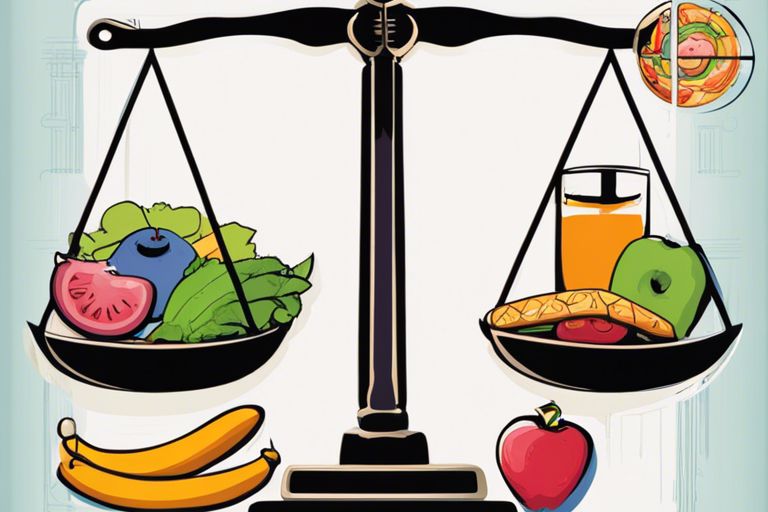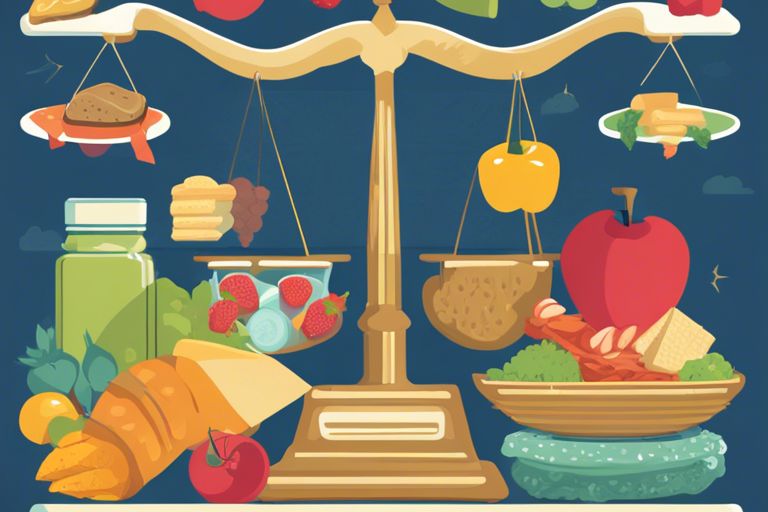Most of us have heard a plethora of nutritional myths floating around, from the idea that carbs are the enemy to the belief that superfoods can cure all ailments. In this blog post, we will investigate into the most common misconceptions about nutrition and separate fact from fiction. By shedding light on these dangerous myths, we hope to empower readers to make informed choices about their diet and lifestyle. Let’s explore the science-backed facts behind what we eat and drink to uncover the truth behind popular beliefs.
Key Takeaways:
- Nutritional myths: There are many misconceptions and myths surrounding nutrition that can lead to misinformation and unhealthy dietary habits.
- Facts over beliefs: It is essential to rely on evidence-based facts rather than common beliefs when making decisions about your diet and nutrition.
- Consult a professional: For accurate information and personalized guidance on nutrition, it is recommended to consult a registered dietitian or nutrition expert.

The Myths of Superfoods
Now, let’s dive into the world of superfoods. These seemingly magical ingredients have been touted as the key to unlocking optimal health and longevity. However, it’s time to separate fact from fiction and debunk some common myths surrounding these so-called superfoods.
The Exotic Elixir Fallacy
Elixir. The idea that exotic superfoods possess mystical powers that can cure all ailments is a widespread misconception. While it’s true that some exotic fruits and plants contain beneficial nutrients, the exaggerated claims surrounding their healing properties are often unfounded. There is no single food that can work miracles in your body or replace a balanced diet. Falling for the exotic elixir fallacy may lead to neglecting other essential nutrients your body needs for overall well-being.
The Organic Obsession
With the rise of the organic food movement, many believe that organic superfoods are inherently healthier than their conventionally grown counterparts. However, studies have shown that the nutritional differences between organic and conventional foods are minimal. The organic obsession can lead to a false sense of superiority and a hefty price tag. It’s essential to focus on a varied diet rich in fruits, vegetables, whole grains, and lean proteins regardless of their organic label.
This highlights the importance of critically evaluating food trends and marketing strategies that may perpetuate myths about superfoods. Consumers should prioritize a diverse range of nutrient-dense foods rather than relying on any single ‘miracle’ ingredient. Making informed choices based on scientific evidence is key to a balanced and sustainable approach to nutrition.
The Low-Fat Fallacy
Some commonly held beliefs about nutrition are deeply ingrained in society, and one of the most persistent myths is the idea that a low-fat diet is the key to good health. However, recent research and scientific evidence have debunked this notion, revealing that the low-fat fallacy may actually be doing more harm than good.
The Misunderstood Role of Dietary Fat
An essential component of a balanced diet, dietary fat is crucial for overall health and well-being. Contrary to popular belief, not all fats are created equal. Healthy fats, such as those found in avocados, nuts, and olive oil, are important for brain function, hormone production, and absorption of fat-soluble vitamins. Restricting fat intake too much can lead to nutrient deficiencies and negatively impact metabolism.
The Cholesterol Conundrum
An ongoing debate in the world of nutrition revolves around cholesterol and its impact on heart health. Low-fat diets were once thought to be the solution to high cholesterol levels, but we now know that the story is much more complex. Research has shown that not all cholesterol is created equal – while high levels of LDL cholesterol can increase the risk of heart disease, HDL cholesterol is actually protective.
The key lies in promoting a balance of healthy fats and incorporating a variety of nutrient-dense foods into our diets. By focusing on whole foods and making informed choices, we can support overall health and well-being.
The Truth About Sugar and Sweeteners
Not all sugars and sweeteners are created equal. In the world of nutrition, there are many myths and misconceptions surrounding sugar and sweeteners. Let’s research into the science behind these substances and separate fact from fiction.
The Fructose Fear
For years, there has been a widespread belief that fructose, a type of sugar found in fruits and honey, is inherently bad for health. Some studies have linked high intake of fructose to various health issues, including obesity and metabolic disorders. However, it’s important to note that these studies often used extremely high doses of fructose that are not typically consumed in a balanced diet. In moderate amounts, fructose from whole foods like fruits can be part of a healthy diet and provide essential nutrients and fiber.
Additionally, the demonization of fructose has overshadowed the role of other factors, such as overall diet quality and calorie intake, in contributing to health problems. It’s not just about cutting out fructose, but rather maintaining a balanced diet that includes a variety of nutrients from whole foods.
Artificial Sweeteners: Friend or Foe?
About artificial sweeteners, there is a lot of debate in the scientific community. Some studies suggest that these sugar substitutes may help with weight management by reducing calorie intake, while others raise concerns about their long-term effects on metabolism and gut health. Artificial sweeteners can be a useful tool for individuals looking to reduce their sugar consumption and manage their weight, but moderation is key.
Plus, it’s essential to consider individual differences in response to artificial sweeteners. Some people may experience negative side effects like digestive issues or cravings for sweet foods, while others may tolerate them well. As with any food or ingredient, it’s important to listen to your body and make informed choices based on your personal health goals and preferences.

Protein Myths and Realities
The Overestimated Need for Protein
To address the myth of needing excessively high levels of protein, let’s explore into the reality of this essential nutrient. Many people believe that they must consume large amounts of protein to maintain muscle mass and overall health. However, the truth is that most individuals, including athletes, do not require as much protein as commonly thought. The Recommended Dietary Allowance (RDA) for protein is only about 0.8 grams per kilogram of body weight, which can easily be met through a balanced diet.
Moreover, excessive protein intake can actually have negative effects on the body, such as putting strain on the kidneys and leading to dehydration. Consuming more protein than the body needs does not necessarily translate to more muscle gain, as any excess is typically stored as fat.
Plant vs. Animal Protein Sources
On the topic of protein sources, there is a common misconception that animal protein is superior to plant-based protein. While animal sources like meat, eggs, and dairy are complete proteins, containing all nine essential amino acids, plant-based sources like beans, lentils, nuts, and seeds can also provide more than enough of these essential nutrients. In fact, incorporating a variety of plant-based proteins into your diet can offer numerous health benefits, such as reducing the risk of chronic diseases and promoting overall well-being.
Plus, plant-based proteins tend to be lower in saturated fats and cholesterol, making them a heart-healthy choice. They also contain essential fiber, vitamins, and minerals that are often lacking in animal-based foods, further supporting a balanced and nutritious diet.
Summing up
The world of nutrition is filled with myths and misconceptions that often lead to confusion and misinformation. However, by exploring the evidence-based facts behind common beliefs, it becomes clear that many of these myths are simply not true. Through critical thinking and a scientific approach, we can separate fact from fiction and make informed decisions about our diet and health. Be mindful of, always question what you hear and seek out reliable sources of information to ensure you are making the best choices for your overall well-being.
FAQ
Q: Is breakfast the most important meal of the day?
A: No, the idea that breakfast is the most important meal of the day is a common myth. While breakfast can provide essential nutrients and energy to start the day, the actual importance of the meal varies from person to person. It’s essential to listen to your body and eat when you are hungry, regardless of the time of day.
Q: Do carbs make you gain weight?
A: Carbohydrates alone do not make you gain weight. Weight gain occurs when you consume more calories than your body needs, regardless of the source of those calories. Carbohydrates are an essential source of energy for the body, and choosing complex carbohydrates like whole grains, fruits, and vegetables can actually support a healthy weight and overall well-being.
Q: Are all fats unhealthy?
A: Not all fats are unhealthy. While trans fats and saturated fats should be limited in the diet, healthy fats like monounsaturated and polyunsaturated fats are essential for overall health. Sources of healthy fats include nuts, seeds, avocados, and fatty fish. These fats are necessary for proper brain function, hormone production, and absorption of fat-soluble vitamins.

